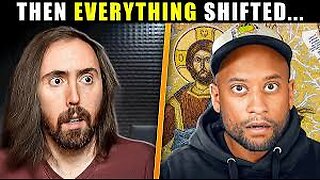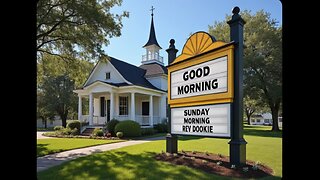Premium Only Content

How To Deal With Doubt • The Todd Coconato Radio Show
How To Deal With Doubt • The Todd Coconato Radio Show
#toddcoconato #doubtgod #remnant #godspower
Website: www.PastorTodd.org
To Give: www.ToddCoconato.com/give
There are two primary ways Christians can stop doubting God. The first is reading the Bible. In order to stop doubting, trust must be built. But it is hard to trust a stranger, or even an occasional acquaintance. When salvation occurs and the Holy Spirit takes up residence in one’s heart, it is just the beginning of a lifelong journey (and beyond) of getting to know God. The primary way of knowing God is reading the Bible. One thing that the Bible makes abundantly clear is that God is faithful, trustworthy, and good. As we fill our minds with the proofs of God’s power and love through history, we are better able to overcome doubt. “Faith comes from hearing the message, and the message is heard through the word about Christ” (Romans 10:17).
The Bible is unique because it is God-breathed (2 Timothy 3:16), which means the words on the pages may look ordinary but they are inspired by the Holy Spirit. God’s Word even “judges the thoughts and attitudes of the heart” (Hebrews 4:12). Bible reading encourages us (Romans 15:4), satisfies and sustains us (Matthew 4:4), and guides us through life better than any GPS (Psalm 119:105). The Bible simultaneously reveals God to us—what He is like, what He loves, and what He hates. And the more a believer learns about the person of God, the more his faith will increase—and the less he will doubt.
The second way Christians can stop doubting God is prayer. Prayer may be the most difficult discipline to develop in the believer’s life, but it is also the most rewarding. Our reading of Scripture should prompt our praying. In Daniel 9:2–3, we read, “I, Daniel, understood from the Scriptures, according to the word of the Lord given to Jeremiah the prophet, that the desolation of Jerusalem would last seventy years. So I turned to the Lord God and pleaded with him in prayer and petition, in fasting, and in sackcloth and ashes.” In other words, Daniel knew from Scripture that God was going to end Israel’s captivity, and that knowledge spurred him to pray. Why did Daniel pray for what he already knew would happen? Because Daniel knew that God uses the prayers of His people in the working out of His eternal purposes. If God is so benevolent that He would allow us such an important place in His plan for this world, surely we can trust Him to hear our prayers and answer them.
Not only does God hear our prayers, but whatever we ask in accordance with His will shall come to pass (Luke 11:9–13). In the words of Andrew Murray, “Let no delay shake our faith. Of faith it holds good: first the blade, then the ear, then the full corn in the ear. Each believing prayer brings a step nearer the final victory. Each believing prayer helps to ripen the fruit and bring us nearer to it; it fills up the measure of prayer and faith known to God alone; it conquers the hindrances in the unseen world; it hastens the end.”
Our prayers should be made daily, in a quiet place with no distractions. It’s good to keep a prayer journal. There’s no need to write down every detail of your prayers, but do write some of your petitions, and, when God answers, write that down also. It won’t be long before you have a bona fide record of how God supernaturally speaks into the lives of His children through answered prayer. This can be a tremendous help in overcoming doubt.
God doesn’t want His people to doubt Him; He wants them to be confident in His love, watchfulness, and protection. Do not hesitate to call to Him; He has promised to answer (Jeremiah 33:3).
-
 29:09
29:09
Todd Coconato Show
2 days ago"Jesus Did It!" with Catherine Mullins • The Todd Coconato Show
684 -
 26:20
26:20
marcushouse
1 day ago $2.63 earnedBREAKING: Starship Launch Approved, and the New Reveal No One Expected!
10.5K10 -
 13:05
13:05
WhaddoYouMeme
1 day ago $6.26 earnedHe AGREED w/ Me…Until it Got Too Spiritual.
22.3K14 -
 LIVE
LIVE
Scottish Viking Gaming
1 hour ago💙Premium Creator :|: Sunday Funday :|: Splitgate and beyond!
50 watching -
 LIVE
LIVE
LittleMissBear
5 hours agoAnime Games With MissBear
49 watching -
 27:28
27:28
Scary Mysteries
2 days agoHunted Until Death: The Terrifying Stalker Mystery of Cindy James
10.5K3 -
 LIVE
LIVE
DookiePox
2 hours agoGood Morning. Sunday Morning.
16 watching -
 19:14
19:14
DepressedGinger
1 day ago $1.05 earnedTrump approval *SKYROCKETS* as economy improves
14.9K7 -
 1:00:01
1:00:01
BEK TV
1 day agoGABE BROWN’S REGENERATIVE FARMING REVOLUTION
3.89K1 -
 2:45:48
2:45:48
John Fredericks Media Network
1 day ago $0.10 earnedJohn Fredericks Show 5/23/25
5.2K1